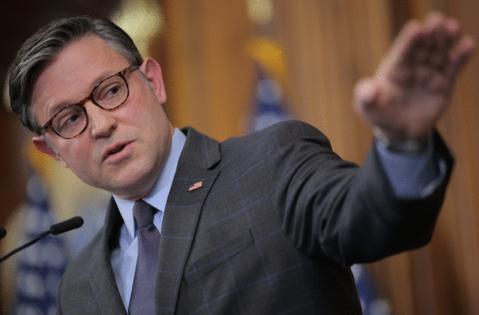US shutdown drags on with Republicans and Democrats trading blame
Published in Political News
WASHINGTON — Congressional leaders continued to blame the other party for the U.S. government shutdown as President Donald Trump doubled down on his threats to use the stalemate, now in its ninth day, to make sweeping cuts to Democratic priorities and the federal bureaucracy.
There was no sign of progress as government workers and military personnel prepare for missed paychecks and the general public begins to fell the effects of the closure on everything from taxpayer services to air travel.
Trump has repeatedly threatened to fire federal workers, withhold back pay for some government employees and cut funding for programs favored by Democrats, but so far none have materialized. Some Republicans have questioned that strategy, saying it distracts from their messaging to blame Democrats for the shutdown effects.
The Senate has canceled plans for a recess next week to stay in Washington if the shutdown persists, a person familiar with the decision said Thursday. Speaker Mike Johnson, however, has declined to call House lawmakers back since before the shutdown started, insisting that the House did its job by passing a stopgap funding bill that would reopen the government through Nov. 21.
Johnson, taking questions from callers on C-SPAN Thursday morning, continued to insist that Democrats approve a so-called “clean” temporary spending measure, and that their alarm about expiring subsidies for people who obtain health insurance through the Affordable Care Act could be addressed later.
One of the callers, a woman who said she was a Republican with a military spouse at Fort Belvoir in Virginia, implored him to allow a vote on pay for the armed forces and said her medically fragile children might have to forgo medication.
“I’m begging you to pass this legislation. My kids could die,” she said. “You could stop this.”
Johnson, while displaying concern, responded that “the Democrats are the ones preventing you from getting a check.”
Rep. Hakeem Jeffries of New York, the House Democratic leader, asked on Bloomberg Television about the possibility that the military might not get paid, pointed out that the chamber’s Republican leaders have not called members back to the Capitol.
“Why are they all on vacation in the middle of a government shutdown?” he said.
He added that “we are willing to sit down and evaluate in good faith anything that could advance the ball here for working class Americans, middle class Americans and everyday Americans.”
At the same time, Republicans quickly seized on a comment by Senate Minority Leader Chuck Schumer, who in expressing confidence that the Democrats’ focus on health care was resonating with voters, told Punchbowl News that “every day gets better for us.”
“While Schumer is celebrating, Americans are suffering,” the White House posted on X.
Senate Majority Leader John Thune told CNBC that a solution to the dispute would likely “get solved organically by rank and file Democrats, because their leadership has no interest in a solution.”
Trump claimed he was speaking with Democrats about the shutdown, but didn’t provide any names and added he was unclear who was leading the party at this point.
He also reiterated his threat that cutbacks could be in the offing.
“We’ll be cutting some very popular Democrat programs that aren’t popular with Republicans, frankly, because that’s the way it works. They wanted to do this, so we’ll give little taste of their own medicine,” he said during a Cabinet meeting on Thursday.
Republican Sen. Markwayne Mullin, a Trump ally, also suggested cuts — particularly to some of the 750,000 workers furloughed because they were deemed non-essential — would come even after the government ultimately reopens.
“We know the president wants to shrink the size of government. He ran on that. We want to shrink it too,” Mullin said, adding that he “would imagine” the firings would be made after the shutdown.
On Thursday, Johnson suggested that tensions are so high that it wouldn’t be productive to have House lawmakers in Washington.
“Is it better for them to be physically separated right now? It probably is,” he told reporters.
Some fellow Republicans, however, are starting to question his decision to keep lawmakers out of Washington. Both Rep. Kevin Kiley, who represents a California swing district, and Rep. Marjorie Taylor Greene of Georgia, have called for a return to the Capitol next week.
There have been few signs of movement toward a deal to reopen the government since funding ran out on Oct. 1.
Democrats are demanding a permanent extension of health care subsidies set to expire at the end of the year. They also want to reverse Medicaid cuts included in Trump’s signature tax law, as well as language ensuring funds are spent as directed without interference from the White House.
Some Republicans have voiced an interest in extending the so-called Obamacare subsidies with reforms, but the leadership has insisted that any formal bipartisan negotiations on the issue take place after the government is reopened. Informal talks between rank-and-file moderates in each party are ongoing, but a path forward has yet to materialize.
The subsidies remain broadly unpopular among Republican lawmakers.
At the leadership level, Republicans are refusing to engage with Democrats. Rather than negotiate with the other party’s leadership, Republicans are hoping to flip a handful of rank-and-file Democratic senators to back the GOP stopgap spending bill. Some have floated passing individual appropriations bills one-by-one, a long, arduous process in the Senate.
Republicans need five Democrats to join Sens. Catherine Cortez Masto of Nevada, John Fetterman of Pennsylvania and Independent Angus King of Maine, who caucuses with Democrats, to back their stopgap bill to end the shutdown.
_____
(With assistance from John Harney.)
©2025 Bloomberg L.P. Visit bloomberg.com. Distributed by Tribune Content Agency, LLC.
























































Comments